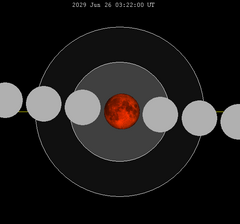July 2047 lunar eclipse
| Total eclipse | |||||||||||||||||
 | |||||||||||||||||
| Date | 7 July 2047 | ||||||||||||||||
|---|---|---|---|---|---|---|---|---|---|---|---|---|---|---|---|---|---|
| Gamma | −0.0636 | ||||||||||||||||
| Magnitude | 1.7513[1] | ||||||||||||||||
| Saros cycle | 130 (36 of 72) | ||||||||||||||||
| Totality | 100 minutes 49 seconds | ||||||||||||||||
| Partiality | 218 minutes 31 seconds | ||||||||||||||||
| Penumbral | 333 minutes 27 seconds | ||||||||||||||||
| |||||||||||||||||
A total lunar eclipse will take place on July 7, 2047. It will last 1 hour 40 minutes and 49 seconds and will plunge the full Moon into deep darkness, as it passes right through the centre of the Earth's umbral shadow. While the visual effect of a total eclipse is variable, the Moon may be stained a deep orange or red colour at maximum eclipse. This will be a great spectacle for everyone who sees it. The partial eclipse will last for 3 hours and 39 minutes in total.
The moon will pass through the center of the Earth's shadow. Totality will last 100 minutes 49 seconds, the second longest for this Saros series.
Visibility
[edit]It will be completely visible over most of the Pacific Ocean, seen rising over Australia and Eastern Asia, and setting over North and South America.
Related lunar eclipses
[edit]Lunar year series
[edit]| Descending node | Ascending node | |||||
|---|---|---|---|---|---|---|
| Saros | Date Viewing |
Type Chart |
Saros | Date Viewing |
Type Chart | |
| 115 | 2046 Jan 22
|
Partial
|
120 | 2046 Jul 18
|
Partial
| |
| 125 | 2047 Jan 12
|
Total
|
130 | 2047 Jul 07
|
Total
| |
| 135 | 2048 Jan 01
|
Total
|
140 | 2048 Jun 26
|
Partial
| |
| 145 | 2048 Dec 20
|
Penumbral
|
150 | 2049 Jun 15
|
Penumbral
| |
| Last set | 2045 Aug 27 | Last set | 2045 Mar 03 | |||
| Next set | 2049 Nov 09 | Next set | 2049 May 17 | |||
Saros series
[edit]Lunar saros series 130, repeating every 18 years and 11 days, has a total of 71 lunar eclipse events including 56 umbral lunar eclipses (42 partial lunar eclipses and 14 total lunar eclipses). Solar Saros 137 interleaves with this lunar saros with an event occurring every 9 years 5 days alternating between each saros series.
| Greatest | First | |||
|---|---|---|---|---|
 The greatest eclipse of the series will occur on 2029 Jun 26, lasting 102 minutes.[2] |
Penumbral | Partial | Total | Central |
| 1416 Jun 10 | 1560 Sep 4 | 1921 Apr 22
|
1957 May 13
| |
| Last | ||||
| Central | Total | Partial | Penumbral | |
2083 Jul 29
|
2155 Sep 11 | 2552 May 10 | 2678 Jul 26 | |
| 1903 Apr 12 | 1921 Apr 22 | 1939 May 3 | |||

|

|

|

|

|

|
| 1957 May 13 | 1975 May 25 | 1993 Jun 4 | |||

|

|

|

|

|

|
| 2011 Jun 15 | 2029 Jun 26 | 2047 Jul 7 | |||

|

|

|

|

|

|
| 2065 Jul 17 | 2083 Jul 29 | ||||

|

|

|

| ||
Half-Saros cycle
[edit]A lunar eclipse will be preceded and followed by solar eclipses by 9 years and 5.5 days (a half saros).[3] This lunar eclipse is related to two annular solar eclipses of Solar Saros 137.
| July 2, 2038 | July 12, 2056 |
|---|---|

|

|
See also
[edit]Notes
[edit]- ^ For a partial or total lunar eclipse, this value denotes the umbral magnitude. For a penumbral lunar eclipse, this denotes the penumbral magnitude.
- ^ Listing of Eclipses of cycle 130
- ^ Mathematical Astronomy Morsels, Jean Meeus, p.110, Chapter 18, The half-saros
External links
[edit]- 2047 Jul 07 chart: Eclipse Predictions by Fred Espenak, NASA/GSFC




